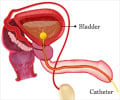A recent article reviews guidelines for the treatment of uncomplicated urinary tract infections with antibiotics in women.

An article reviewing guidelines for the treatment for uncomplicated urinary tract infections in non-pregnant women were recently published in the US Pharmacist. The guidelines were formulated by the Infectious Diseases Society of America and the European Society for Microbiology and Infectious Diseases in 2010.
Antibiotics Guidelines for Lower Urinary Tract Infections - Cystitis and Urethritis
The guidelines recommend the use of nitrofurantoin, trimethoprim-sulfamethoxazole (TMP-SMZ) or fosfomycin as the first choice drugs for acute uncomplicated cystitis.
If these cannot be used for some reason, fluoroquinolones like ofloxacin, ciprofloxacin and levofloxacin may be used for 3 to 7 days. Though fluoroquinolones are very effective, they should not be used as the first choice. This is because excessive use of these drugs may result in bacterial resistance, thus making these drugs ineffective when they are required for more serious infections.
β-lactams like amoxicillin/clavulanate, cefaclor and cefpodoxime are used as alternatives to fluorquinolones, though they have been found to be less effective. Ampicillin or amoxicillin used alone should be avoided to prevent the development of resistance.
Antibiotics Guidelines for Pyelonephritis or Kidney Infections
Hospitalized patients with pyelonephritis may initially be treated with an intravenous fluoroquinolone, an aminoglycoside with/ without ampicillin, an extended-spectrum cephalosporin, an extended-spectrum penicillin or a carbapenem. The antibiotic may be changed once the culture report is available.
The physicians should also monitor the patients for possible drug interactions and side effects caused by these antibiotics.
Reference:
1. Allana J. Sucher. Stacey Smith. Update on the Treatment of Acute Uncomplicated Cystitis and Pyelonephritis in Women. US Pharm. 2011; 36(6):39-43.
Source-Medindia
 MEDINDIA
MEDINDIA



 Email
Email










